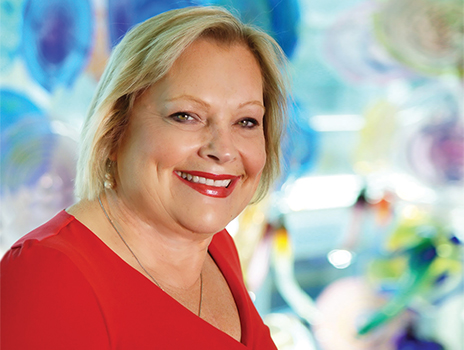Routine Heart Assessment Saved Her Life


October 21, 2018
Shirley Allenbrand could have missed so many wonderful experiences – her son's wedding, trekking across Europe with her daughter, cheering at her grandson's first T-ball game. She'd have missed all that and so much more if she would have died suddenly in 2005 from a heart aneurysm she didn't know she had. A similar condition claimed actor John Ritter. Few people survive if the aneurysm ruptures.
What saved the Olathe businesswoman's life was a routine heart assessment at The University of Kansas Health System. At 49, she'd had no symptoms of heart disease, no pain. She'd scheduled an assessment only because a friend at the hospital urged her to before starting intensive workouts with a personal trainer.
Results of a routine stress test alarmed her cardiologist and led to further tests. A cardiac catheterization revealed a thoracic aortic aneurysm in her upper aorta that was "about to blow" – rating 4.9 on a 5-point scale for severity. Stunned, Allenbrand learned she needed a complex open heart surgery.
"They told me even lifting a suitcase could've killed me," she says. "Pretty scary, considering I'd just shoveled our driveway and the neighbor's."
In March 2005, cardiothoracic surgeons repaired the aneurysm and replaced her damaged aortic valve. The surgery was a success, and Allenbrand soon began cardiac rehabilitation and recovery. She found out what steps she needed to take to prevent future aneurysms, and she began learning more about her heart.
"I never cared about my heart 'numbers' before," she says. "I know there are other very active, busy women out there who don't know theirs either. After my experience, I made a commitment to help women learn these things about their hearts."
Many people with aneurysms don't know they have them until they erupt, and the survival rate is low at that point. In fact, Allenbrand's health insurance company did not have a system in place to cover her rehabilitation and prevention efforts, because survival is so rare.
She credits the leading-edge cardiac care from her surgeons, physicians and care staff at The University of Kansas Health System with helping her beat the odds.
"If I had monitored my heart health numbers, my problems would have been discovered earlier, and my treatment would have been more preventative and less complicated," Allenbrand says. "My story is a success, but I've also learned from this experience the value of knowing your own body, your own heart and taking the right steps to ensure you are personally healthy."
Fast forward several years, and you find a different Shirley. She and her daughter Tiffany and daughter-in-law Heather have lost more than 160 pounds between them on a weight loss and exercise program. Now an avid golfer, she also recently ran a half marathon (13.5 miles).
The biggest change is her passionate advocacy for improving women's heart health. A longtime civic leader in Kansas, she's thrown her high-energy organizational skills into promoting awareness of women's heart disease at local, state and national levels.
Shirley touts The University of Kansas Health System's heart health services to all who'll listen, insisting friends and colleagues schedule assessments. She also works with cardiologists through the health system's Cardiac Risk Reduction Clinic, and shares her story to motivate other women to know their numbers and take action.
"I'm just so incredibly grateful to this hospital for saving my life," she says. "That's why I'm so committed to helping save other women's lives."
I'm just so incredibly grateful to this hospital for saving my life. – Shirley Allenbrand